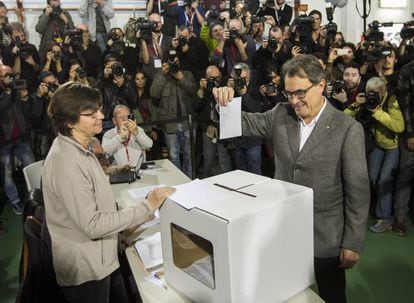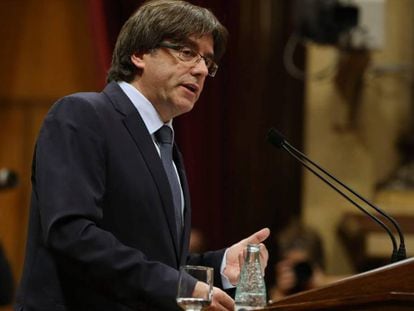Prosecutor calls for 10-year ban from office for former Catalonia premier
Artur Mas facing court ruling based on role in unofficial referendum on independence


Catalonia’s public prosecutor on Monday called for the region’s former premier, Artur Mas, to be handed a 10-year ban from public office over his role in organizing a non-binding vote on self-rule for the region in November 2014.
The vote, which yielded a majority support for independence but was seen as having little value by outside observers, went ahead on November 9 of that year despite a court injunction.
Prosecutors insist Mas is guilty of gross misconduct and disobedience, and he is facing a 10-year ban from public office
Prosecutors insist Mas is guilty of gross misconduct and disobedience. He now faces a 10-year ban from public office. Former Catalan deputy premier Joana Ortega and ex-regional education commissioner Irene Rigau have also been named by prosecutors as accessories in the matter and could face bans of nine years.
If they are found guilty, prosecutors would like to see them barred from all forms of public office at any level.
Mas, Ortega and Rigau are facing trial for their role in organizing Catalonia’s non-binding referendum in November 2014 – a vote that went ahead despite being suspended by Spain’s Constitutional Court. The court blocked the vote after Spain’s central government of the time, led by the conservative Popular Party, filed an appeal, saying the ballot was illegal because all Spaniards should be allowed to vote on an issue that affects the entire country.
Mas, the most visible figure in the lead-up to the vote in the region of 7.5 million people, argued that the Catalan regional government was no longer involved in the ballot after the Constitutional Court veto came into effect on November 4, with the task of organizing it handed over to volunteers. Prosecutors claim, however, that private companies tasked with the organization continued to operate after that time.
Mas “developed a complete and effective strategy of defiance after the suspension,” the prosecutor’s office said in a brief. Mas and his aides were “aware” that they were defying the veto, the brief added.
Mas “developed a complete and effective strategy of defiance after the suspension,” said the prosecutor’s office
Mas and his aides moved “off center stage” and attempted to generate the impression that “the process had stopped,” the prosecutor’s offices said. But they claim this was not the case, citing the existence of documents showing how private contractors continued to carry out work include mass mailing campaigns, the maintenance of websites dedicated to the vote and IT tasks.
Prosecutors highlighted the fact that on November 7 and November 8, two companies, T-Systems and Fujitsu, delivered and set up 7,000 laptops that were to be used on the day of the referendum. This equipment was then delivered to public schools where voting stations were set up for the November 9 ballot.
Lawyers for the prosecution argue that Mas and his aides should be tried concurrently for the twin crimes of gross misconduct and abuse of authority. There is another option though: if the courts decide to try each crime separately, the penalties would remain similar. In the case of Mas, he would face an eight-year ban from public life for gross misconduct and 18 months more for disobedience. Punishment for this last crime would, however, also include a fine, which prosecutors put at €36,000.
Prosecutors highlighted the fact that T-Systems and Fujitsu delivered 7,000 laptops that were to be used on the day of the referendum
Artur Mas left office in January 2016 after regional elections ended in stalemate and he failed to gain the support necessary for his investiture as premier.
His replacement, Carles Puigdemont, recently announced he wanted to hold a unilateral referendum in September 2017. Speaking in the Catalan parliament Puigdemont also reached out to the central government, saying it would be best to agree on a negotiated referendum. But then he added that “this proposal does not expire, but it does not paralyze us, either,” suggesting that the vote will go ahead with or without Madrid’s support.
English version by George Mills.












































